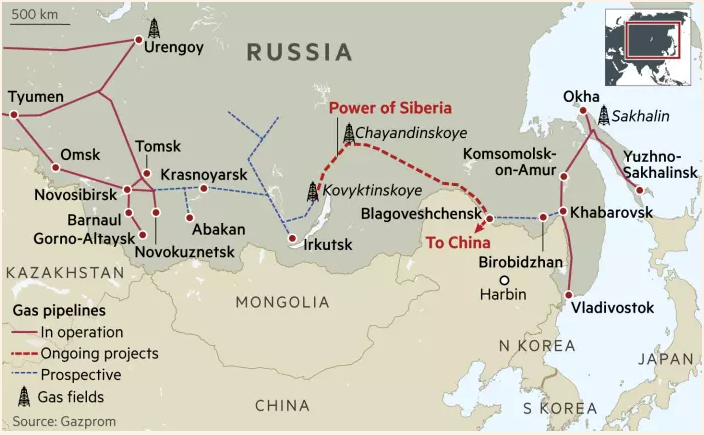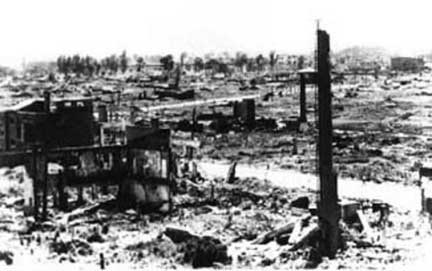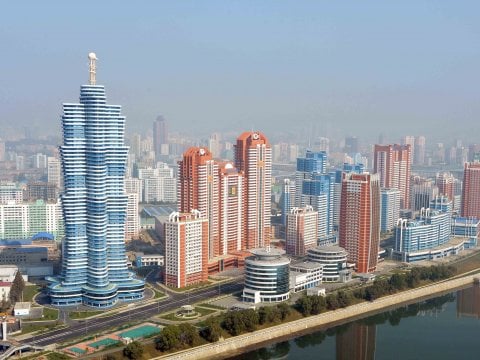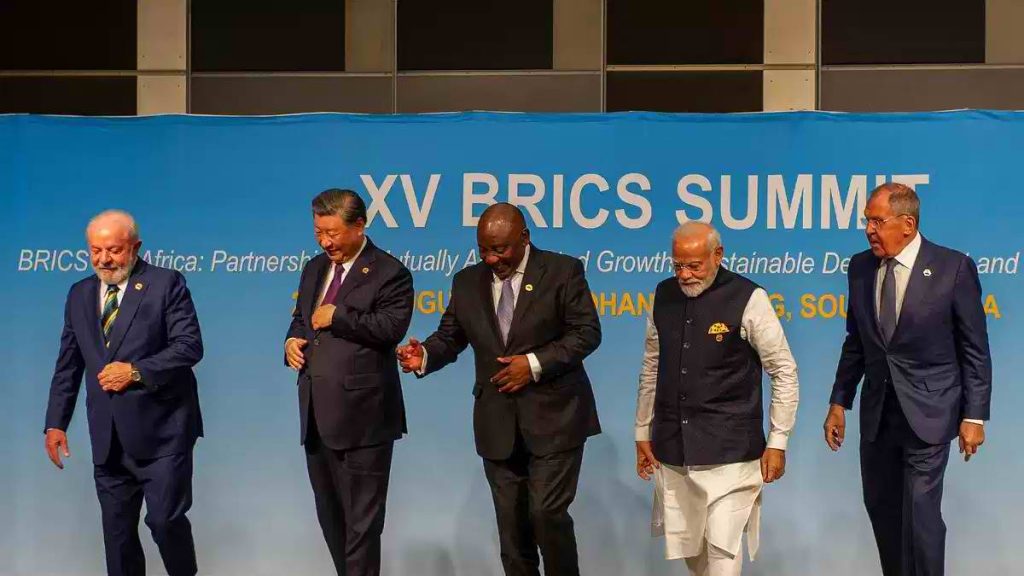North Korea and the Kim-Putin Summit: March Toward the Promised Land, the Multipolar World?
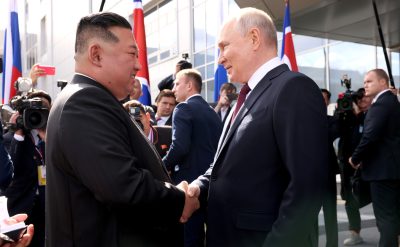
All Global Research articles can be read in 51 languages by activating the Translate Website button below the author’s name.
To receive Global Research’s Daily Newsletter (selected articles), click here.
Click the share button above to email/forward this article to your friends and colleagues. Follow us on Instagram and Twitter and subscribe to our Telegram Channel. Feel free to repost and share widely Global Research articles.
***
To my surprise, the Kim-Putin Summit of September (13-17) 2023 was scarcely analysed by the Western media. This may be due to the poverty of revealed contents of the summit or the fear of mentioning those agreements which were too unfavourable to the West.
What you find, in the major mainstream Western media was only transactional agreement by virtue of which North Korea agrees to send weapons to Ukraine in exchange with military as well as non-military aid to North Korea. But, the summit was far more meaningful and important than what the Western media report.
As far as I am concerned, the Kim-Putin summit was a milestone event which may lead to new world where the unipolar world led by Washington will end and where the multipoplar world will appear so that several polar countries exist in peace and cooperate for the global prosperity security and stability.
This paper puts focus on the following issues:
- Summit Objectives
- Summit Agreements
- Summit Impact on North Korean Security and Economy
- Summit Impact on the Global Hegemony Fight
Summit Objectives
This question of summit objectives has two sub-questions. Why did North Korea want the summit? What has motivated Russia to join the summit?
Why Did North Korea Join the Summit?
The DPRK has the following reasons for joining the summit.
The first reason is North Korea’s victory over the U.S. in the nuclear dispute allowing Pyongyang to have confidence in its capacity to defend itself from American nuclear attack and its ability to negotiate at the summit as equal. At this point, it seems relevant to see the evolution of the North Korean “nuclear crisis.”
Late President Kim Il-Sung planned the nuclear development to face the American nuclear threat during 39 years from 1953 to 1992.
Late Supreme Leader Kim Jong-Il provided five occasions to Washington to let North Korea to give up nuclear development but the U.S. blew them all. This has allowed the North Korea to develop nuclear bombs and ICBM. This took 24 years from 1992 to 2016.
Chairman Kim Jong-Un came along in 2012 and made four nuclear bomb tests and numerous missiles tests.
North Korea tested in 2017 a H-bomb test and in 2018, it launched ICBM, Hwasung-14 in 2017 and, in 2923, Hwasung-18 with a range of 15,000 KM reaching the whole of the U.S. territory.
The U.S. nuclear game with North Korea is over. North Korea is now a bona fide nuclear state.
The second reason is the de facto Japan-ROK-US military alliance.
North Korea fears the possible attack by the Japan-ROK-US (JAROKUS) military alliance. Each one of the alliance countries may want to attack North Korea.
Japan wants it because North Korea is a military threat.
The U.S. wants it because North Korea has become real nuclear power.
The PJCSK under Yoon wants it because if Koreas are reunited, Yoon and the PJCSK will be alienated and even punished.
Under such situation, North Korea has to prepare for the possible attack by the combined armed forces of Japan, ROK and the U.S. This is one of the reasons for North Korea to join the summit. Russia-DPRK military cooperation would decrease the danger of a (Japan-ROK-US) JAROKUS attack.
The third reason is the need for North Korea’s participation in Russia’s Far East Development.
Soon, the Ukraine proxy war will be over with Russia’s victory. Russia’s post-Ukraine proxy war priority is the development of its immense Siberia region. At this moment, only 35% of Siberia is developed. Vladivostok has population of only 600,000. It has unlimited natural resources including gas, oil and variety of minerals.
Moreover, the Arctic region offers various natural resources: 80% of Russian gas, 20% of its oil, 15% of its GDP and 2.5% of its population (Pepe Escobar, 21cir. com. September 16, 2023)
The future of the North Korean economy depends on its integration into the Eurasian economic bloc led by Russia and China.
Why Did Russia Join the Summit?
First, Vladimir Putin intends to make Russian Far East Russia’s growth pole.
Russia needs hard-working North Korean labour force. It needs year-round unfrozen ports of Razin Sonbong located in North Korean’s North East right below the Russian border.
Besides, Russia needs the rich market of the Korean peninsula ready to consume Russian natural resources; the Korean peninsula offers the opportunity of connecting Korea with the Trans-Siberia Railroad which will surely speed up the development of the Fareast Russia.
Second, there is also the worsening global security situation which has led Russia to join the summit.
The Russia’s military operation in Ukraine has made it sure that the dialogue and the peace between the West and Russia have become impossible. Russia needed a reliable security partner.
North Korea has become a vital partner not only for economic reason but also for security necessity.
Third, during the government of Moon Jae-in representing the liberal nationalist South Korea (LNSK), the ROK-Russia relations had been dynamic and showed great potentials. This was the reason why Russia kept distance from North Korea
But, now, the idiotic pro-Japan conservative Yoon Suk-yeol has become president and joined the Washington war camp and, to make the matter worse, Yoon sent munitions and weapons to Ukraine. This has allowed Russia to upgrade its relations with North Korea and to join the summit.
Summit Agreements
The summit did not produce any joint statement making it difficult to know concrete agreements. Only thing we can do is to examine strategic places visited by Kim Jong-un and statements made by two leaders and their advisors.
In the light of places visited by Kim Jong-un and the two leaders’ statements, we may be able to identify three areas of agreements: comprehensive cooperation agreement opening door to various types of cooperation, military cooperation agreement and agreement for the promotion of multipolar world order.
Comprehensive cooperation: The agreements seem to be very comprehensive and this is reflected in the statements of the two leaders.
The following statements made by the two leaders and the Kremlin spokesperson seem to indicate wide range of cooperation in years to come.
“Well, there are certain restrictions (sanctions) and Russia complies with all these restrictions. But there are things that we can of course talk about, discuss, think about it.” (Vladimir Putin)
“North Korea is our close neighbour. And, despite any comments from the outside, we will build our relations with our neighbour in a way that is beneficial to us and our neighbour.”(Kremlin spokes person, Dimitry Pescov)
“We have always supported all the decisions by President Putin and those by the Russians people.” (Kim Jung-un)
“In conclusion, I would like to express my confidence that our delegation’s current visit will serve an important moment in the future development and transformation of traditional friendly Russian-DPRK ties into unbreakable relations of strategic cooperation.” (Kim Jung-un)
The military cooperation: The military cooperation was revealed by numerous Kim’s visit to key military facilities and the composition of North Korean delegation, North Korean participation for the Ukraine war and leaders’ statements.
Image: Russian Air Force, RF-81719, Sukhoi Su-35S (Licensed under CC BY-SA 2.0)
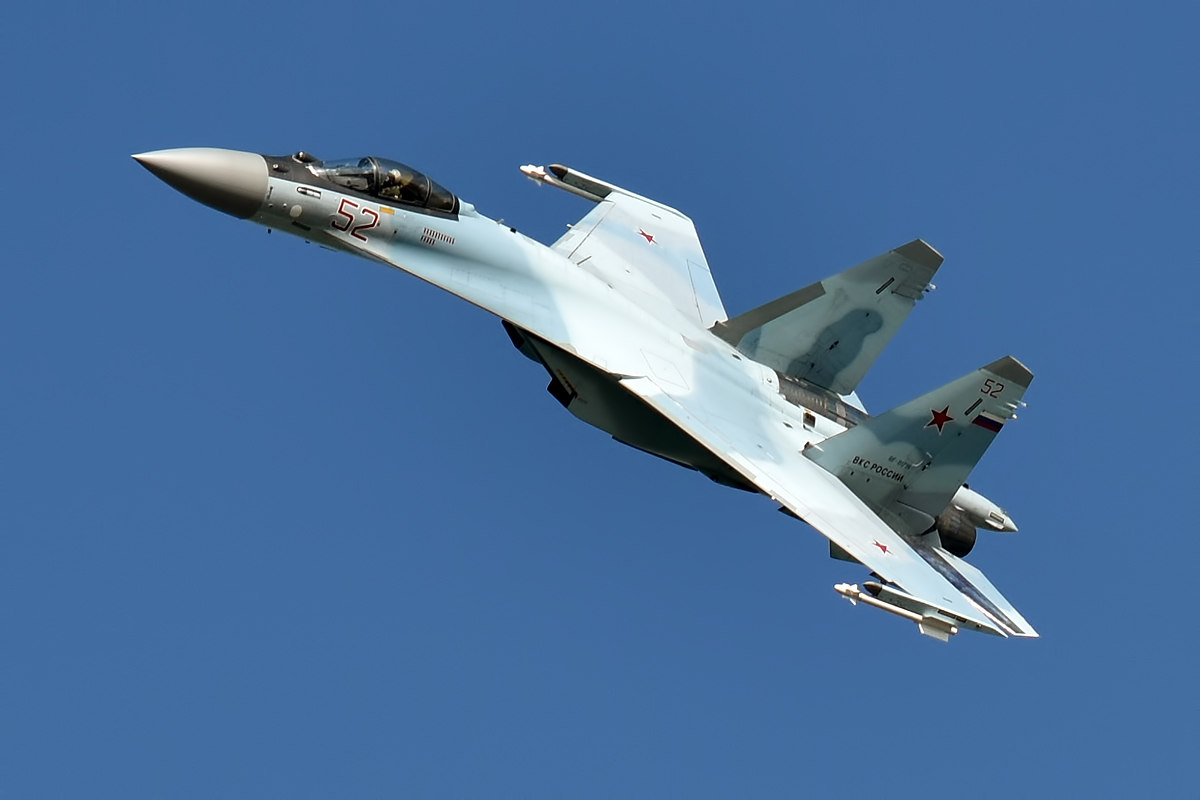
Kim’s visits included the site of the production of fighter jets including Su-35 and Su-57, the satellite launch pad of Soyuz-2 space craft at the Vostochuny Cosmodrom, the visit of bombers: TU-16-, TU95M5 and TU22M3 bombers and nuclear submarines.
Kim was accompanied by key people in North Korean national defence including Jo Chun-byong, ruling party member in charge of munitions production policy, Pak Tae-song, Chairman of the space and technology committee and Admiral Kim Byung-sik involved in the production of spy satellite and nuclear capable sub-marine.
It is reported that North Korea was sending to Ukraine munitions and weapons in exchange for Russian military aid.
There are some meaningful statements made by the two leaders.
“We are proud of the development of our space industry, and this ability is now for us. I hope that you and your colleagues are interested.” (Vladimir Putin)
When asked by the media if Russia would help North Korea for the development of satellite technology, Putin answered:
“That is why we are here.”
According to South Korean North Korea experts, in addition to the cooperation for satellite technology and nuclear submarine technology, North Korea will become a part of Russia-DPRK supply chain for military equipment and parts.
Summit Impact on North Korean Security and Economy
The impacts of the summit on North Korea include the liberation from American sanctions, increased protection from the JAROKUS attack, possibility to realize its potential economic growth and North Korea’s role for the creation off the multipolar world
Liberation from American sanctions: After 70 years of fight against American nuclear threat and sanctions, North Korea can finally liberate from American oppression and sanctions owing to the summit which will allow North Korea to integrate its economy with the Eurasian economic bloc led by Russia and China.
Protection from the JAROKUS attack: the summit has given the warning to ROK, Japan and US not to think of attacking North Korea, because if they do, it will be door open to WWIII.
Potential economic growth: North Korea has resources for great potential growth. It has well educated and well trained hardworking labour force. It has strategic geopolitical characteristics favouring foreign investments; it has untouched natural resources; it has efficient infrastructure for technological development.
The integration of North Koreans economy into the Eurasian economic bloc provides the opportunity to transform its potential growth into actual growth.
North Korea’s role in the creation of multipolar world: what follows is the elaboration of such role.
Summit Impact on the Global Hegemony Fight
Both Russia and North Korea are known for their criticism of the unipolar world and their conviction for the inevitability of the coming of the multipolar world.
It appears that, in the summit, the Russia-DPRK cooperation for the creation of multipolar world order was, perhaps, the most important issue discussed. The world knows that Putin has been arguing for the need for multipolar world for decades.
There are some statements referring to the multipolar world:
“The Russian army and people will certainly win a great victory in the strategic struggle for the punishment of a great evil that claim hegemony and feed passionate expansionist illusion.” (Kim Jong-un)
“North Korea not only provides Russia with munitions, but also supports the Kremlin’s efforts to push back against what Mr. Putin describes as Western hegemony.” (Alexander Gabuev in New York Times September 3, 2023)
“The DPRK and the Russian Federation are creating a multi-polar world and building a new, fair and rational international order based on the principle of equality, mutual respect and friendly cooperation.” (Prof. Chung Kiyul, editor- in-chief of the 4th Media, interview with Sputnic, 21cir.com September 14, 2023)
“The Kim-Putin summit first and foremost apparently intends to nullify, pacify, or ruin whatever the U.S. led suicidal nuclear game, especially in Korean peninsula and Ukraine.” (Prof. Chung Kiyul, editor-in chief of the 4th Media, ibid)
Pyongyang: Then and Now
THEN: Total Destroyed as a Result of US Bombings (1950-53)
NOW: The Reconstruction of Pyongyang
In this paper, I will first discus the present state of the global hegemony war on the one hand and on the other, the role of North Korea.
The present state of the hegemony war: It is analysed in terms of falling mono-polar camp force and rising multipolar camp force.
Falling unipolar Camp Force. The following shows the trend of falling power of the unipolar camp.
First, when UN member countries voted for the sanctions against Russia’s military intervention into Ukraine, only 45 countries voted for as against 140 countries against. This means that only 76% of the countries were against the sanctions.
Second, the NATO countries found themselves in a situation where they have not only exhausted their weapons to aid the Ukraine proxy war, but also their industries were ruined due to their decoupling from Russian economy. What is more terrible is EU’s obligation to import American oil and gas at exorbitant price in comparison with the price of Russian oil and gas.
Third, democracy is falling. The number of countries where democracy has improved fell from 83 to 28, in the period, 2005-2020. The number of countries where democracy deteriorated rose from 52 to 73, in the same period. The number of countries dissatisfied with democracy rose from 48% to 58% in the period, 1995-2020.
Fourth, the US economy is no longer dominant: In 1960, the US GDP was 40% of the global GDP. But in 2019, it represented mere 24% to fall further to 16% in 2023. The use of economic aid as tool of hegemonic domination has been losing its importance.
Fifth, the US-led free-trade agreement, globalization and the global value chain have resulted in the destruction of the potential economic development of developing countries leading to the anti-US movements.
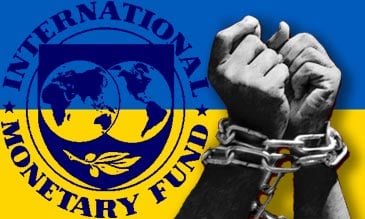 Moreover, neo-liberalism has contributed to exacerbating the international income distribution in favour of the rich countries at the expense of poor countries’ interests on the one hand, and on the other, increase unequal income distribution within the country in favour of the rich and the powerful.
Moreover, neo-liberalism has contributed to exacerbating the international income distribution in favour of the rich countries at the expense of poor countries’ interests on the one hand, and on the other, increase unequal income distribution within the country in favour of the rich and the powerful.
Sixth, the free trade regime, neoliberal competition, the debt-trap policy of IMF, the corruption of the pro-West leaders of developing countries, multinational corporations’ grave human rights violations and their theft of target countries’ natural resources, forced child labour and destruction of eco-system of the developing world have been the means of exploiting the poor countries.
Seventh, the endless and limitless sanctions against non-pro-U.S. countries have produced intolerable human misery throughout the world.
- Nobody knows to what extent the normal development of target countries’ economy has adversely been affected.
- Nobody knows how many children died due to the sanctions against the imports of medicines.
- Nobody knows how these sanctions put in danger the safety of the people and the security of the country.
- Nobody knows by what extent these sanctions have destroyed the potential growth of the target countries.
Eighth, Washington’s regime-change policy is surely one of the most brutal and merciless destruction of the target countries. Dozens of countries have been targets of Washington’s regime change. The objective of regime change is to force the target country to become Washington’s vassal state and serve the Washington’s interests at the expense of the country’s own interests. In fact, the regime-change policy is regime-destruction policy.
Ninth, the unchanging Washington’ foreign policy is the strengthening of its military power. Despite its economic weakening, its military expenditure has been increasing leading to less money needed for American citizens’ well being.
The American share of military expenditures in the world increased from 37% in 1990 to 40% in 2023, while its share in global GDP fell from 24% in 1960 to 16% in 2023.
This shows to what extent the U.S. attaches importance to its military might. Washington has 750 military bases in more than 85 countries and numerous Special Forces are deployed along with CIA troops.
The US military is used to intimidate, threaten and even attack countries which do not serve the American interests.
All these elements of the US foreign policy reflect the falling power of the mono-polar world managed by Washington. And this has resulted in the increasing number of countries which seek multi-polar world in which each country can live in peace cooperating with other countries.
Rising Multi-Polar Camp
The state of rising multi-polar camp may be presented in terms of the following factors: the number of countries in the multipolar camp, various means to fight the mono-polar camp’s offensive and increasing uprisings against pro-West corrupted governments in Africa and elsewhere.
First, the number of countries of the multipolar camp has been increasing. The number of the BRICS has increased from 5 to 11. The new member countries are Argentine, Egypt, Ethiopia, Iran, Saudi Arabia and United Arab Emirates. In addition, 40 countries would like to join.
It is interesting to note that Iran, leader of the Shia Islam and Saudi Arabia, leader of Sunni Islam are now member of the BRICS. This could imply possible improvement in assuring greater peace in the Middle East and strengthen the multipolar camp.
There is the Shanghai Cooperation Organization (SCO) which has the following member countries: China, Kazakhstan, Kyrgyzstan, Russia, Tajikistan, Uzbekistan, India, Pakistan and Iran. In addition, the number of observer countries has been increasing.
BRICS already represent 40% of world population and 25% of the global GPD as against 16% for the U.S. and 30% for G-7 countries. With six new members, its importance in population and GDP will further increase.
Second, there are some economic and financial institutions which will facilitate the creation of the multipolar world. There is the BRICS’s New Development Bank (NDB), the Asia Infrastructure Investments Bank (AIIB), The Belt-Road Initiative (BRI).
There are also numerous regional multilateral economic organizations designed to assure more independence from the domination of the unipolar camp.
Third, the Global South begins to fight for the freedom from the pro-West political leaders. The best example is the violent military uprisings in French Africa.
In French Africa, the surge of military coups is designed to take away power from the corrupted pro-West government and establish government which would promote the interests of the people.
The following shows the countries where military coup took place in Africa: Chad (April, 2121), Mali (May, 2021) Guinea (October, 2021), Sudan (October, 2021), Burkina Faso (January, 2022), Niger (July, 2023), Gabon (August, 2023) (Mathew Ehret 21 cir. com September 19, 2023)
These countries are rich in natural resources including diamond, manganese, uranium, iron, natural gas, oil, fresh water and other natural resources. The exploitation of these resources is monopolized by French companies such as Eramet, and Total SA.
But, the people live with USD 1.0 a day and the poverty rate is between 30% and 70%. How can this happen in such natural resource-rich countries?
What we see now is the closing of the era of mono-polar camp and the beginning of the multipolar camp.
But, whether we like or not, the unipolar camp remains powerful being capable of threatening the emerging multipolar camp. US dollars still dominates; countless international organization including UN, WTO, WHO, WB, IMF and so many other institutions have been strengthened over decades and serve mainly the interests of the mono-polar camp.
What is called rule-based laws are conceived and applied in order to protect mainly the interests of the unipolar camp.
Indeed, it is a long way before we see the world in which the U.S. coexist with multipolar countries and cooperate in peace respecting sovereignty of countries for global security and prosperity.
We can have hope for the leadership of the BRICS and other organizations, but it is long way before it can lead us to the multipolar world. To do so, the people of the multi-polar countries should wake up and fight for the better world.
2023 BRICS Summit (Source: InfoBrics)
Peter Koenig has something to say about it:
So what we expect from BRICS?
“Again we the people, let us wake up and take life in our own hand and minds. Let us not be fooled, confused and divided by deceptive strategies of the self-nominated rulers.” (Peter Koenig, Globalresearch.ca September 19, 2023)
Roles of North Korea: The message of Koenig seems clear. The establishment of a multipolar world can be done only by the people, not by the political leaders. The ordinary people should be the reliable driving force of the noble task of constructing the new world where all countries can live in peace without the fear of being cheated, oppressed and exploited.
In order that the people can lead the march to the multi-polar world, the people should become the master of the country.
This requires proper doctrines allowing a new way of thinking and doing.
Juche (主體)
Such doctrine includes the North Korean idea of Juche (主體), Juche philosophy (主體思想), Juce behaviour (主體行爲) and Juche system (主體制度).
The sum of these four ways of thinking and doing constitutes Juche doctrine (主體主義).
Juche: Juche means “organiser”, “initiator”, “planner” or “decision maker”. If I organize a seminar, I am the Juche of the seminar. If you decide to sell your house, you are the Juche of house sale.
In North Korean, Juche must make decisions in autonomous way without interference of outsider. The Jucche may consider other people’s advice, but Juche’s decision should be autonomous and independent
Juche Philosophy: Now, the Juche philosophy is a little more complex. It refers to the relation of individual with God, with the national leader and with the nation. Each individual determines these relations. That is, each individual in North Korea is the master of everything.
The core of the Juche philosophy is the relation between individual on the one hand and, on the other, the national leader and the country.
Here, brace yourself!
You will see a sort of metaphysics of individual’s relation with the national leader and the nation.
According to the Juche metaphysics, individual is “infused” with the leader and the nation so that the three elements of North Korea become “one” and the “same.”
What the individual thinks is what the leader thinks; what the leader thinks is what the nation thinks.
The suffering of individuals is the suffering of the leader and the nation. The joy and the pains of the leader is the joy and pains of the individuals and the nation.
The core of the Juche philosophy is fact that the Juche of collective life is the individual. That is, the individual is the master. What the leader thinks and does is what individual thinks and does
Long time ago, a North Korean group of beautiful lady cheer leaders came to Pusan city of South Korea for the Asian Game. One day, it was raining and the portrait of Kim Jong-il was wet. Undoubtedly, the cheer leasers might have thought that they were wet, too, because they were Kim Jong-il and Kim Jong-il was the cheer leaders.
The cheer leaders were crying seeing their leader’s portrait was wet. I thought that they were acting, but they were sincere.
Juche Behaviour: The Juche philosophy has immense impacts on North Koreans’ behaviours. Let us see the Juche behaviours of the leaders followed by those of the people
Juche Behaviours of leaders: It is a duty for the national leaders to live with the people by visiting farms, factories, schools, hospitals and local communities, because the leaders are the people.
- Kim Il-sung spent four say a week by visiting and talking to the people to know what the people want.
- We see often Kim Jong-il and Kim Jong-un visiting places where the people live and work
- According to a man who knows North Korea very well, in North Korea, there is no military academy. All officers are former simple soldiers. The 4-star general who used to be a simple soldier spends many hours and lives the life of simple soldier every month
Juche Behaviour of North Korean people: the following summarizes North Korean people’s Juche behaviour.
- North Korean people survived the long march of hunger and suffering in the 1990s.
- North Koreans endured the never ceasing threatening joint military exercises by ROK-US armed forces.
- North Koreans survived the merciless sanctions
- North Koreans do not protest against the leader not because of fear of the authorities but due to their love for the leaders and the country. Remember, the leaders are the people.
- Every North Korean is a soldier and worker making North Korea a powerful military power
- Every North Korean is an intelligence agent preventing spies.
Juche System: Juche behaviour leads to the Juche system of politics, national defence and national economy. The Juche system has produced the following results.
- North Korea has never become vassal state of any country. This is North Korea’s political independence
- North Korea has become a nuclear state capable of defending itself from American nuclear threat. This is North Korea’s autonomous national defence
- North Korean economy has survived the economic sanctions. This is North Korean’s road to self-sufficient national economy.
Coming back to the role of North Korea in the fight for the creation of the multipolar world, I think that the Juche doctrine can contribute to the selection of national leaders who identify themselves with the people. One should avoid leaders who are corrupted by receiving bribes given by foreign forces. Unfortunately, there are too many of them.
The multipolar camp need strong, well motivated, devoted and highly trained people to confront the mighty unipolar camp and construct sustainable multipolar world.
For this, the multi-polar camp needs Juche force which will be ready to meet head on the offensive of the unipolar camp.
North Korea is ready to train such force. We remember that the Juche doctrine has played strategic role in the fight against neo-colonialism in developing countries
In fact, by the end of the 1970s, there were 1,000 Juche study centers in the world. In the period, 1972-1989, as many as 33 African countries had Juche Study centers. Even now, a good number of African countries operate such centers including Benin, Congo, Egypt, Guinea, Nigeria, South Africa, Tanzania, Tunisia and Uganda.
No doubt, North Korea can play various roles for the establishment of the multi-polar world as it becomes more powerful and its economy becomes more developed.
But, what is needed now is the formation of well trained fighting force that can resist the onslaught of the mono-polar forces and create solid bases for the sustained development of the multi-polar world. North Korea can offer such training.
*
Note to readers: Please click the share button above. Follow us on Instagram and Twitter and subscribe to our Telegram Channel. Feel free to repost and share widely Global Research articles.
Dr. Joseph H. Chung is professor of economics at the University of Quebec in Montreal (UQAM), member of Study Center on Integration and Globalization (CEIM -UQAM).
He is a Research Associate of the Centre for Research on Globalization (CRG).
Featured image: Kim Jong Un and Vladimir Putin meeting at Vostochny Cosmodrome in Amur Oblast, Russia (13 September 2023) (Licensed under CC BY 4.0)


